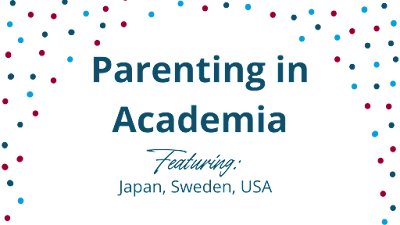Parenting in Academia III: Japan, Sweden, USA

In the last two weeks, we gained a lot of advice and suggestions from parenting scientists from all around the world. Some of the proposed changes will need time to be implemented as well as financial support to cover, for example on-site childcare. However, some changes can be made more easily such as not scheduling official institute meetings after 5 pm. This week we will hear from Dr. Shannon McKinney-Freeman (St. Jude Children’s research Hospital, USA) and Dr. Kenichi Miharada (Kumamoto University, Japan). They share their experience on how to progress as a scientist, while also spending time with your family. They focus on the financial challenges and the availability of daycare. One major take-home message from our journey around the world is, that the country-specific circumstances for parental leave and child care/child support are very different. Let’s try to learn from each other and implement as many beneficial measures as possible at our institutes to make scientific career...


